#to a ripoff
Text
I get it, but I think the “Doctor Who looks like crap that’s why we love it” mentality towards the special effects and imagery kills me. I get it, but I dunno, it’s always so reductive to the whole swathes of truly impactful imagery and magic tricks throughout the whole show, the classic serials and whatever else, as well as reductive to the budget and production contexts, I dunno. What are we comparing to? Hollywood level budget? Cinematic money?
#I became obsessed with older special effects pretty early as a kid with Harryhausens and Godzilla and the like and I dunno#like take Godzilla when you step out of Tokusatsu fanbases you just get swarmed by IT LOOKS SO FUNNY AND BAD AND SILLY THAT'S WHY WE LOVE IT#a) no#b) you cannot deride these special effects without diving into the history of developing an entire rival art form to Hollywood and the like#c) compared to fucking what?#d) Godzilla Effects So Bad Lmao is actually a very Hollywood-centric mentality that dates back to Harryhausen himself reducing Godzilla#to a ripoff#and I dunno don't you LIKE seeing the artifice and the craft?#Don't you like seeing the magic trick?#Hartnell's first two years brim with insanely surreal and haunting imagery#and I'm baffled I don't see anyone else talking about how hard the Troughton era retools 50s B-scifi aesthetics?#season 7 looks and feels INCREDIBLE all cold and violent and scary#I admit a lot of Pertwee looks fuzzy and wobbly but again is the context and the successful illusions doing nothing for you?#Hinchcliffe/Holmes is the colonist fiction it is and I'm sorry but tHE STORM MINER?#The forests of Planet of Evil and Face of Evil???#I've gone on a lot about why I love so much of the look and effects of s18 to more or less Caves#but Six's time slides into something really really strikingly strange that I feel really can't be fixed to Bad or So Bad It's Good I dunno#I dunno!#I think I just really dislike the SO BAD IT'S GOOD mentality
19 notes
·
View notes
Text
im just someones weird sister
#unemployed voice. cant find the original tumblr search sux#<- twas a blatant ripoff of the “im just someones weird coworker” post which i could not find#also. havent deleted it because i like very occasionally seeing my mutuals pop up in the notes
98K notes
·
View notes
Text
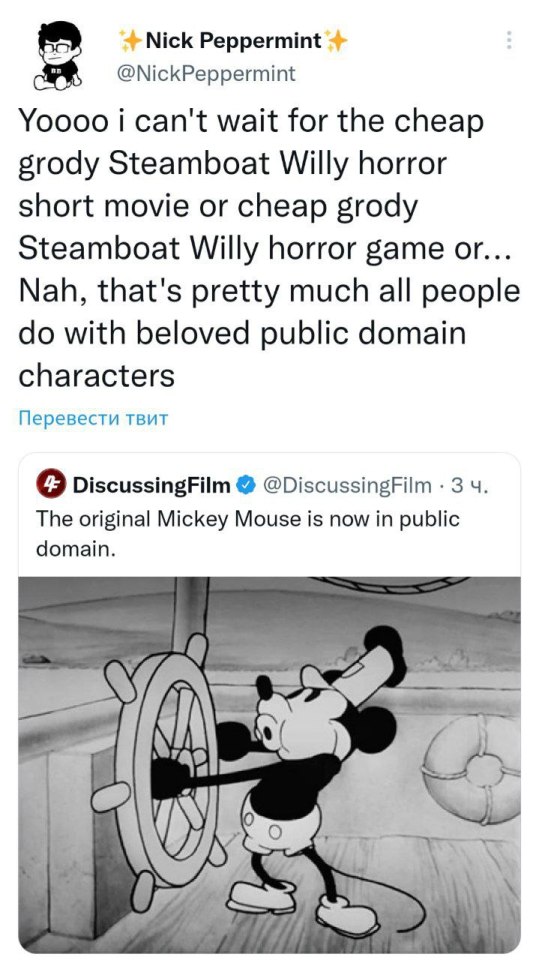
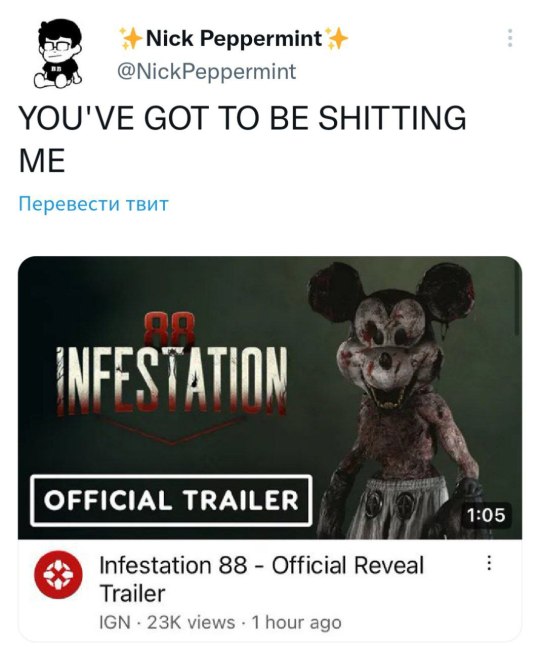
They didn't waste a second...
#public domain was a mistake#y'all ain't do NOTHING fun with it#Disney#Mickey Mouse#Steamboat Willie#Animation#horror#creepypasta parody#meme#shitpost#screenshot#why is it always quick cashgrab horror ripoff that isn't even scary#do you have any idea how many cool things you can do with this domain#yall had Winnie The freaking Pooh in public domain and there was NOTHING but dumb horror
18K notes
·
View notes
Text

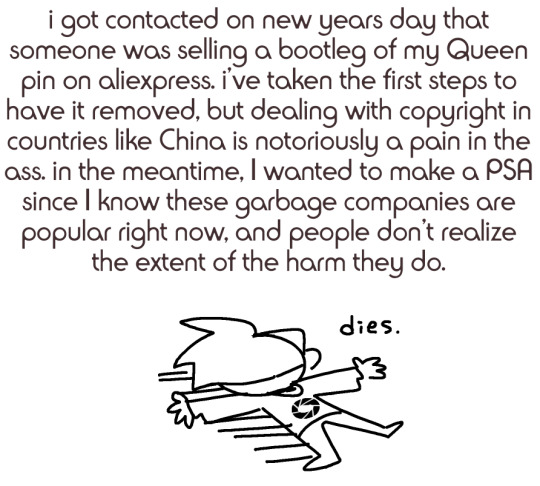
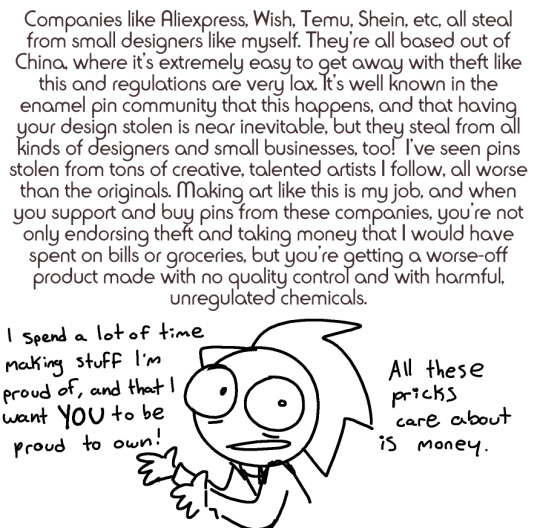
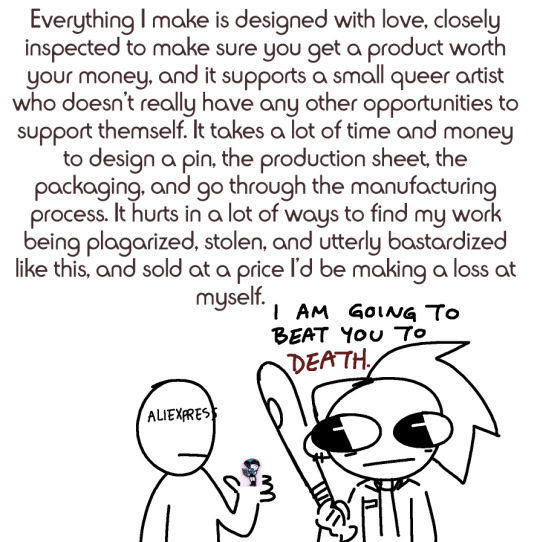
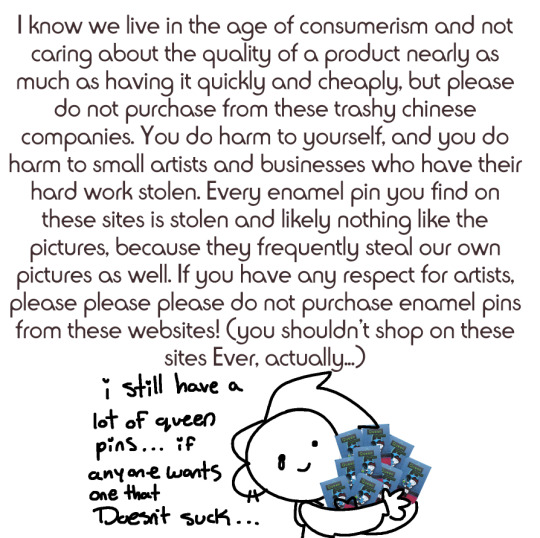
worst way to start my new year, thanks. i have a lot of things to say about these companies but i'm tired and just keeping it focused to the pin side of things for this one. do not ever buy pins from these companies, literally ALL of them are stolen from small artists like me. if you want to buy enamel pins, check out etsy, and artist's personal websites and shops! (though even Etsy has some bootleg pins that ship straight from china, so tread carefully…)
Every pin I've designed is, thus far, EXCLUSIVE to my etsy. if you find it anywhere else, it's been ripped off! and once these stupid bootlegs pop up, it's basically a never ending game of whack-a-mole trying to get them all taken down...
#psa#art theft#pin theft#aliexpress#shein#wish#temu#deltarune#the bootleg pin is just over an inch tall. do you know how BAD this design looks at that size?? i'd know. i tested it.#they didn't even use the black nickel of the pin for the black parts of the design. and the listing says copper for some reason. what.#some people never even get their designs taken down. its really sad#so i might just have to deal with bootleg queens out there forever :( i hope nobody confuses the ripoffs for the real thing....#my pin is so much nicer! its almost two inches big and it has two posts on the back so it doesn't spin#because spinning pins are the bane of my existence#im out here working my ass off out of my bedroom in my parents place trying to make a living and here come these pricks#i watermarked all my listing photos exactly so they Couldn't steal my fucking pictures so at least there's that#my new years is just full of bad luck so far i hope this isn't a bad omen#if my registration isn't accepted by the aliexpress copyright department I'm SOL and this will just. stay up i guess#i'm sad#bootleggers kys
3K notes
·
View notes
Text
There’s never just one ant
So there's a great Thai restaurant in my neighborhood called Kiin. Yesterday, I searched for their website to order some takeout. Here's the Google result.
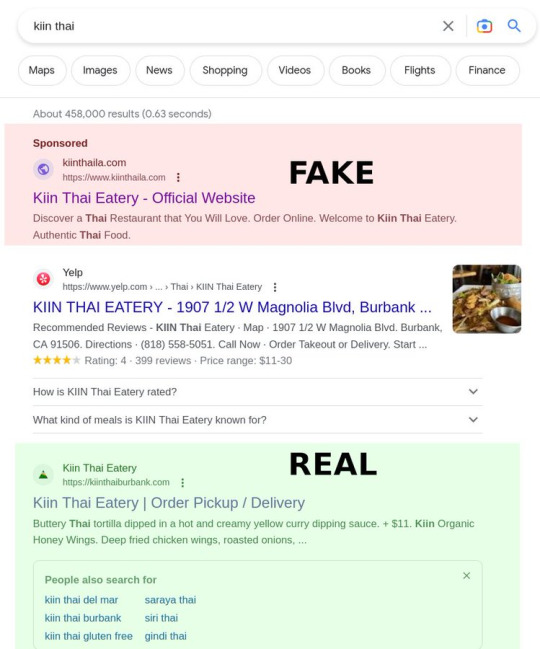
That top result (an ad)? It's fake. It goes to https://kiinthaila.com, which is NOT the website for Kiin.
The *third* result is real: https://kiinthaiburbank.com
Fake site:

Real site:

I got duped. I placed an order with the fake site. The fake site then placed the order - in my name! - with the real site, having marked up the prices by 15%. Kiin clearly knows they're doing this (presumably by the billing data on the credit card the fakesters use to place the order). They called me within minutes to tell me they'd cancelled the fakesters' order.
I could still come pick it up, but I'd have to pay them, and cancel the payment to the fakesters with Amex. Actually, as it turns out, I have to cancel TWO payments, because the fakesters DOUBLE-charged me.
Here's what that charge looks like on my Amex bill. See that phone number? (415) 639-9034 is the number for Wix, who provides the scammers' website.

How the actual FUCK did these obvious scammers get an Amex merchant account in the name of "KIINTHAILA" by after supplying the phone number for a website hosting company? What is Amex's KYC procedure? Do they even call the phone number?
And why the actual FUCK is Google Ads accepting these scam artists' ads for a business that they already have a knowledge box for?! Google KNOWS what the real KIIN restaurant is, and yet they are accepting payment to put a fake KIIN listing two slots ABOVE the real one.
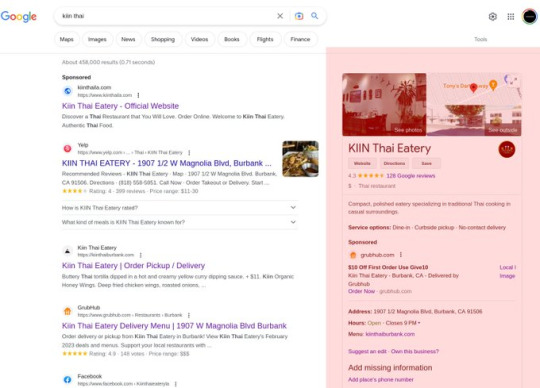
To be fair to these scammer asshole ripoff creeps who are trying to steal from my local mom-and-pop, single location Thai eatery, they're just following in the shoes of Doordash and Uber Eats, who did the same thing to hundreds (thousands?) of restaurants during lockdown.
Doug Rushkoff says that the ethic of today's "entrepreneur" is to “Go Meta” - don't provide a product or a service, simply find a way to be a predatory squatter on a chokepoint between people who do useful things and people who use those things.
These parasites have turned themselves into landlords of someone else's home, collecting rent on a property they don't own and have no connection to.
There's NEVER just one ant. I guaran-fucking-tee you that these same creeps have 1,000 other fake Wix websites with 1,000 fake Amex merchant accounts for 1,000 REAL businesses, and that Google has sold them ads for every one of them. Amex and Google and Wix should be able to spot these creeps FROM ORBIT. Holy shit do we live in the worst of all possible timelines. We have these monopolist megacorps that spy on and control everything we do, wielding the most arbitrary and high-handed authority.
And yet they do NOT ONE FUCKING THING to prevent these petty scammers from using their infra as force-multipliers to let them steal from every hungry person patronizing every local restaurant.
I mean, what's the point of letting these robber-barons run the entire show if they're not even COMPETENT?
ETA: Dinner was delicious
11K notes
·
View notes
Text
snl wishes they could be this funny prepared, let alone off the cuff. nobody has perfected the art of comedic timing like zac oyama has but also, nobody could work with other comedians well as these guys do.
#i watched the snl skit they’re referring to and it’s so unbearably unfunny#it’s some guy talking about a podcast idk#it drones on for so long#unsurprisingly make some noise did it much better#and yes i realize that msn is merely a ripoff of whose line is it anyway#but does whose line have you feeling as parasocial to the contestants as this show does#whenever i see kimia behpoornia on my tv screen i go feral#and it’s because of this show#i would never want to pit two bad bitches against each other#good thing snl isn’t a bad bitch#make some noise#josh ruben#zac oyama#brennan lee mulligan#bleem#dropout#sam reich#snl#saturday night live#tiny desk concert
912 notes
·
View notes
Text
#asoiaf#a song of ice and fire#valyrianscrolls#it doesn't count as a shameless ripoff if i'm shamelessly ripping off myself
444 notes
·
View notes
Text

@philosophiums and i have been nursing the beginnings of an atla au so have some preliminary designs while we cook :>
#my art#jujutsu kaisen#jjk#fanart#jjk fanart#atla!au: art#jjk atla!au#atla!au: design#lmhs#this is all im gonna be thinking abt actually JHFHGFGGH#apparently we were brainstorming fr. 10 hours...............#so yes. brain is Worms and the worms are shaped like this#ill flesh these out later but fr now i am very happy#wld like to thank bolin for his shirt and the kyoshi warriors for their usage of emerald green so megumi can have his blue tones#every1 say thank u source materiallllll#i definitely Will have to work on yuujis outfit to make it less of a direct ripoff of bolin GJFSD#as it stands his hood and shirt length r rly all that differentiate the design#oh well! problem fr future me smile#edit i fixed th shirt @ past me ur welcome
1K notes
·
View notes
Text
i love the pokemon fans ripping palworld designs apart like "this flower is from lilligant! this neck fluff is from hisuian arcanine! this is sylveon's neck tassels and bow!" yeah and it fucks next question.
#op#'its a blatant ripoff!' THATS THE POINT#and its FUN#palworld#we are at 'simpsons did it' levels of saturation
770 notes
·
View notes
Text
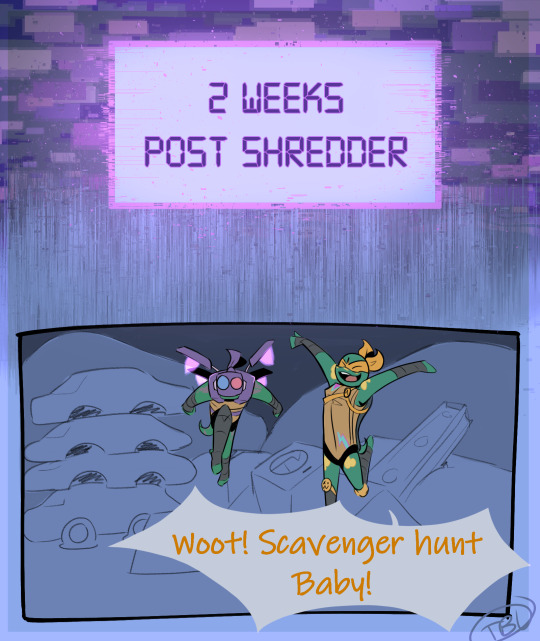
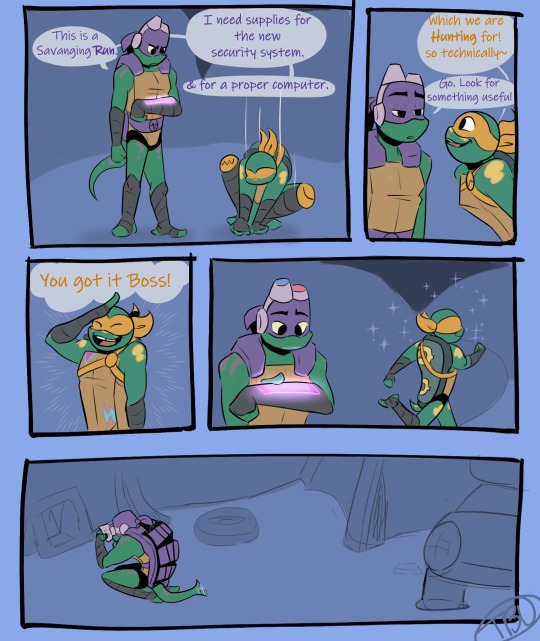


The Preferable Alternative- Prologue - Part 1
Start (you are here) - Previous (none) - Next
New au. I can't explain the main thought behind this without spoilers. And since i'm jumping straight into a multi-part comic, i won't be giving out any.
Basically vibes for this is that it's kinda creepy and maybe suspenseful with eventual hurt/comfort (if that doesn't make sense, im sorry, i have a hard time describing things). I'm also pretty mean to Donnie. Not "Donnie vs" mean, but unfortunately this idea wouldn't work with anyone else.
(for those that get anxious, like me. There is no main character death. (might not be death at all but we shall see. that depends on one character and even i'm not sure exactly what they'd do yet.) and no one's gets serious physical injuries. Definitely more hurt/comfort than plain angst. b/c that's how i roll. I can't do straight up angst.)
I'll write a proper summery once the prologue's done. I don't want to spoil it too much. For now, just know it's a PB&J duo story that happens during the 6 weeks before the Krang invasion.
#tmnt#rottmnt#preferable alternative#my doodles#rise donnie#rise mikey#this is my friday update#and it's actually on friday!#i can't wait until i can talk about what this whole comic is about#and why i wanted to do it#and where i got the title#b/c the title is in reference to a line found in a different series#and it fits the base of this story so damn well#but that's spoiler territory#so i will wait until later#and hey look#the ''So Not A Nintendo Ripoff'' company shows up again#in the form of a purple see-through Not-gameboy advanced#and yes i had too much fun with that#(i was just going to draw a generic device)#(but then i was like ''but what if gameboy?'')#(and now it's a gameboy lol)
569 notes
·
View notes
Text

Erm silly little season 3 wiwi wisp concept doodle
#jrwi#jrwi show#jrwi fanart#jrwi art#just roll with it#jrwi prime defenders#william wisp#jrwi pd#my art#I don’t really know much about dc comics but I thought it would be fun to make him another ripoff#so he’s very much intentionally supposed to look like Flatline here haha
405 notes
·
View notes
Text

on vacation so i might aswell take orel with me
WELCOME TO İSTANBUL OREL!! subverted your expectations. you thought I'd post bloberta and clay or cult leader au orel. no. somewhat show accurate orel in istanbul. take that. (working on those too)
orels travels reference
#moral orel#orel puppington#istanbul#art#orels travels#im a ripoff#fanart#moral orel fanart#moral orel fandom#ibispaintx#ibispaint art
166 notes
·
View notes
Text

requested by canadian-venom-ripoff
#blue#purple#wordart#flying too close to the sun means i don’t have to deal with your bitch ass#canadian-venom-ripoff
2K notes
·
View notes
Text

I need that old man to be able to kick the fuck out of someone ok
additional doodles (with updated legs)

#phighting#phighting fanart#phighting medkit#he's one of my faves to draw now and that is 100% because of the leg enhancers#i love. LOVE mechanical legs#since medkit is more of an inventor than a doctor (iirc from lore) i figured he'd have something to aid him in phights#and i wanted to put a unique spin on the deer part of his design#so you can have ur von lycaon ripoff#lolllll#planning on making a proper updated version of his design w the newer legs btw i am just busy
241 notes
·
View notes
Text
Surveillance pricing

THIS WEEKEND (June 7–9), I'm in AMHERST, NEW YORK to keynote the 25th Annual Media Ecology Association Convention and accept the Neil Postman Award for Career Achievement in Public Intellectual Activity.

Correction, 7 June 2024: The initial version of this article erroneously described Jeffrey Roper as the founder of ATPCO. He benefited from ATPCO, but did not co-found it. The initial version of this article called ATPCO "an illegal airline price-fixing service"; while ATPCO provides information that the airlines use to set prices, it does not set prices itself, and while the DOJ investigated the company, they did not pursue a judgment declaring the service to be illegal. I regret the error.
Noted anti-capitalist agitator Adam Smith had it right: "People of the same trade seldom meet together, even for merriment and diversion, but the conversation ends in a conspiracy against the public, or in some contrivance to raise prices."
Despite being a raving commie loon, Smith's observation was so undeniably true that regulators, policymakers, and economists couldn't help but acknowledge that it was true. The trustbusting era was defined by this idea: if we let the number of companies in a sector get too small, or if we let one or a few companies get too big, they'll eventually start to rig prices.
What's more, once an industry contracts corporate gigantism, it will become too big to jail, able to outspend and overpower the regulators charged with reining in its cheating. Anyone who believes Smith's self-evident maxim had to accept its conclusion: that companies had to be kept smaller than the state that regulated them. This wasn't about "punishing bigness" – it was the necessary precondition for a functioning market economy.
We kept companies small for the same reason that we limited the height of skyscrapers: not because we opposed height, or failed to appreciate the value of a really good penthouse view – rather, to keep the building from falling over and wrecking all the adjacent buildings and the lives of the people inside them.
Starting in the neoliberal era – Carter, then Reagan – we changed our tune. We liked big business. A business that got big was doing something right. It was perverse to shut down our best companies. Instead, we'd simply ban big companies from rigging prices. This was called the "consumer welfare" theory of antitrust. It was a total failure.
40 years later, nearly every industry is dominated by a handful of companies, and these companies price-gouge us with abandon. Worse, they use their gigantic ripoff winnings to fill war-chests that fund the corruption of democracy, capturing regulators so that they can rip us off even more, while ignoring labor, privacy and environmental law and ducking taxes.
It turns out that keeping gigantic, opaque, complex corporations honest is really hard. They have so many ways to shuffle money around that it's nearly impossible to figure out what they're doing. Digitalization makes things a million times worse, because computers allow businesses to alter their processes so they operate differently for every customer, and even for every interaction.
This is Dieselgate times a billion: VW rigged its cars to detect when they were undergoing emissions testing and switch to a less polluting, more compliant mode. But when they were on the open road, they spewed lethal quantities of toxic gas, killing people by the thousands. Computers don't make corporate leaders more evil, but they let evil corporate leaders execute far more complex and nefarious plans. Digitalization is a corporate moral hazard, making it just too easy and tempting to rig the game.
That's why Toyota, the largest car-maker in the world, just did Dieselgate again, more than a decade later. Digitalization is a temptation no giant company can resist:
https://www.bbc.com/news/articles/c1wwj1p2wdyo
For forty years, pro-monopoly cheerleaders insisted that we could allow companies to grow to unimaginable scale and still prevent cheating. They passed rules banning companies from explicitly forming agreements to rig prices. About ten seconds later, new middlemen popped up offering "information brokerages" that helped companies rig prices without talking to one another.
Take Agri Stats: the country's hyperconcentrated meatpacking industry pays Agri Stats to "consult on prices." They provide Agri Stats with a list of their prices, and then Agri Stats suggests changes based on its analysis. What does that analysis consist of? Comparing the company's prices to its competitors, who are also Agri Stats customers:
https://pluralistic.net/2023/10/04/dont-let-your-meat-loaf/#meaty-beaty-big-and-bouncy
In other words, Agri Stats finds the highest price for each product in the sector, then "advises" all the companies with lower prices to raise their prices to the "competitive" level, creating a one-way ratchet that sends the price of food higher and higher.
More and more sectors have an Agri Stats, and digitalization has made this price-gouging system faster, more efficient, and accessible to sectors with less concentration. Landlords, for example, have tapped into Realpage, a "data broker" that the same thing to your rent that Agri Stats does to meat prices. Realpage requires the landlords who sign up for its service to accept its "recommendations" on minimum rents, ensuring that prices only go up:
https://popular.info/p/feds-raid-corporate-landlord-escalating
Writing for The American Prospect, Luke Goldstein lays out the many ways in which these digital intermediaries have supercharged the business of price-rigging:
https://prospect.org/economy/2024-06-05-three-algorithms-in-a-room/
Goldstein identifies a kind of patient zero for this ripoff epidemic: Jeffrey Roper, a former Alaska Air exec who benefited from a service that helps airlines set prices. ATPCO was investigated by the DOJ in the 1990s, but the enforcers lost their nerve and settled with the company, which agreed to apply some ornamental fig-leafs to its collusion-machine. Even those cosmetic changes were seemingly a bridge too far Roper, who left the US.
But he came back to serve as Realpage's "principal scientist" – the architect of a nationwide scheme to make rental housing vastly more expensive. For Roper, the barrier to low rents was empathy: landlords felt stirrings of shame when they made shelter unaffordable to working people. Roper called these people "idiots" who sentimentality "costs the whole system."
Sticking a rent-gouging computer between landlords and the people whose lives they ruin is a classic "accountability sink," as described in Dan Davies' new book "The Unaccountability Machine: Why Big Systems Make Terrible Decisions – and How The World Lost its Mind":
https://profilebooks.com/work/the-unaccountability-machine/
It's a form of "empiricism washing": if computers are working in the abstract realm of pure numbers, they're just moving the objective facts of the quantitative realm into the squishy, imperfect qualitative world. Davies' interview on Trashfuture is excellent:
https://trashfuturepodcast.podbean.com/e/fire-sale-at-the-accountability-store-feat-dan-davies/
To rig prices, an industry has to solve three problems: the problem of coming to an agreement to fix prices (economists call this "the collective action problem"); the problem of coming up with a price; and the problem of actually changing prices from moment to moment. This is the ripoff triangle, and like a triangle, it has many stable configurations.
The more concentrated an industry is, the easier it is to decide to rig prices. But if the industry has the benefit of digitalization, it can swap the flexibility and speed of computers for the low collective action costs from concentration. For example, grocers that switch to e-ink shelf tags can make instantaneous price-changes, meaning that every price change is less consequential – if sales fall off after a price-hike, the company can lower them again at the press of a button. That means they can collude less explicitly but still raise prices:
https://pluralistic.net/2024/03/26/glitchbread/#electronic-shelf-tags
My name for this digital flexibility is "twiddling." Businesses with digital back-ends can alter their "business logic" from second to second, and present different prices, payouts, rankings and other key parts of the deal to every supplier or customer they interact with:
https://pluralistic.net/2023/02/19/twiddler/
Not only does twiddling make it easier to rip off suppliers, workers and customers, it also makes these crimes harder to detect. Twiddling made Dieselgate possible, and it also underpinned "Greyball," Uber's secret strategy of refusing to send cars to pick up transportation regulators who would then be able to see firsthand how many laws the company was violating:
https://www.nytimes.com/2017/03/03/technology/uber-greyball-program-evade-authorities.html
Twiddling is so easy that it has brought price-fixing to smaller companies and less concentrated sectors, though the biggest companies still commit crimes on a scale that put these bit-players to shame. In The Prospect, David Dayen investigates the "personalized pricing" ripoff that has turned every transaction into a potential crime-scene:
https://prospect.org/economy/2024-06-04-one-person-one-price/
"Personalized pricing" is the idea that everything you buy should be priced based on analysis of commercial surveillance data that predicts the maximum amount you are willing to pay.
Proponents of this idea – like Harvard's Pricing Lab with its "Billion Prices Project" – insist that this isn't a way to rip you off. Instead, it lets companies lower prices for people who have less ability to pay:
https://thebillionpricesproject.com/
This kind of weaponized credulity is totally on-brand for the pro-monopoly revolution. It's the same wishful thinking that led regulators to encourage monopolies while insisting that it would be possible to prevent "bad" monopolies from raising prices. And, as with monopolies, "personalized pricing" leads to an overall increase in prices. In econspeak, it is a "transfer of wealth from consumer to the seller."
"Personalized pricing" is one of those cuddly euphemisms that should make the hair on the back of your neck stand up. A more apt name for this practice is surveillance pricing, because the "personalization" depends on the vast underground empire of nonconsensual data-harvesting, a gnarly hairball of ad-tech companies, data-brokers, and digital devices with built-in surveillance, from smart speakers to cars:
https://pluralistic.net/2024/03/12/market-failure/#car-wars
Much of this surveillance would be impractical, because no one wants their car, printer, speaker, watch, phone, or insulin-pump to spy on them. The flexibility of digital computers means that users always have the technical ability to change how these gadgets work, so they no longer spy on their users. But an explosion of IP law has made this kind of modification illegal:
https://locusmag.com/2020/09/cory-doctorow-ip/
This is why apps are ground zero for surveillance pricing. The web is an open platform, and web-browsers are legal to modify. The majority of web users have installed ad-blockers that interfere with the surveillance that makes surveillance pricing possible:
https://doc.searls.com/2023/11/11/how-is-the-worlds-biggest-boycott-doing/
But apps are a closed platform, and reverse-engineering and modifying an app is a literal felony – several felonies, in fact. An app is just a web-page skinned with enough IP to make it a felony to modify it to protect your consumer, privacy or labor rights:
https://pluralistic.net/2024/05/07/treacherous-computing/#rewilding-the-internet
(Google is leading a charge to turn the web into the kind of enshittifier's paradise that apps represent, blocking the use of privacy plugins and proposing changes to browser architecture that would allow them to felonize modifying a browser without permission:)
https://pluralistic.net/2023/08/02/self-incrimination/#wei-bai-bai
Apps are a twiddler's playground. Not only can they "customize" every interaction you have with them, but they can block you (or researchers seeking to help you) from recording and analyzing the app's activities. Worse: digital transactions are intimate, contained to the palm of your hand. The grocer whose e-ink shelf-tags flicker and reprice their offerings every few seconds can be collectively observed by people who are in the same place and can start a conversation about, say, whether to come back that night a throw a brick through the store's window to express their displeasure. A digital transaction is a lonely thing, atomized and intrinsically shielded from a public response.
That shielding is hugely important. The public hates surveillance pricing. Time and again, through all of American history, there have been massive and consequential revolts against the idea that every price should be different for every buyer. The Interstate Commerce Commission was founded after Grangers rose up against the rail companies' use of "personalized pricing" to gouge farmers.
Companies know this, which is why surveillance pricing happens in secret. Over and over, every day, you are being gouged through surveillance pricing. The sellers you interact with won't tell you about it, so to root out this practice, we have to look at the B2B sales-pitches from the companies that sell twiddling tools.
One of these companies is Plexure, partly owned by McDonald's, which provides the surveillance-pricing back-ends for McD's, Ikea, 7-Eleven, White Castle and others – basically, any time a company gives you a hard-sell to order via its apps rather than its storefronts or its website, you should assume you're getting twiddled, hard.
These companies use the enshittification playbook to trap you into using their apps. First, they offer discounts to customers who order through their apps – then, once the customers are fully committed to shopping via app, they introduce surveillance pricing and start to jack up the prices.
For example, Plexure boasts that it can predict what day a given customer is getting paid on and use that information to raise prices on all the goods the customer shops for on that day, on the assumption that you're willing to pay more when you've got a healthy bank balance.
The surveillance pricing industry represents another reason for everything you use to spy on you – any data your "smart" TV or Nest thermostat or Ring doorbell can steal from you can be readily monetized – just sell it to a surveillance pricing company, which will use it to figure out how to charge you more for everything you buy, from rent to Happy Meals.
But the vast market for surveillance data is also a potential weakness for the industry. Put frankly: the commercial surveillance industry has a lot of enemies. The only thing it has going for it is that so many of these enemies don't know that what's they're really upset about is surveillance.
Some people are upset because they think Facebook made Grampy into a Qanon. Others, because they think Insta gave their kid anorexia. Some think Tiktok is brainwashing millennials into quoting Osama bin Laden. Some are upset because the cops use Google location data to round up Black Lives Matter protesters, or Jan 6 insurrectionists. Some are angry about deepfake porn. Some are angry because Black people are targeted with ads for overpriced loans or colleges:
https://www.theregister.com/2024/06/04/meta_ad_algorithm_discrimination/
And some people are angry because surveillance feeds surveillance pricing. The thing is, whatever else all these people are angry about, they're all angry about surveillance. Are you angry that ad-tech is stealing a 51% share of news revenue? You're actually angry about surveillance. Are you angry that "AI" is being used to automatically reject resumes on racial, age or gender grounds? You're actually angry about surveillance.
There's a very useful analogy here to the history of the ecology movement. As James Boyle has long said, before the term "ecology" came along, there were people who cared about a lot of issues that seemed unconnected. You care about owls, I care about the ozone layer. What's the connection between charismatic nocturnal avians and the gaseous composition of the upper atmosphere? The term ecology took a thousand issues and welded them together into one movement.
That's what's on the horizon for privacy. The US hasn't had a new federal consumer privacy law since 1988, when Congress acted to ban video-store clerks from telling the newspapers what VHS cassettes you were renting:
https://en.wikipedia.org/wiki/Video_Privacy_Protection_Act
We are desperately overdue for a new consumer privacy law, but every time this comes up, the pro-surveillance coalition defeats the effort. but as people who care about conspiratorialism, kids' mental health, spying by foreign adversaries, phishing and fraud, and surveillance pricing all come together, they will be an unbeatable coalition:
https://pluralistic.net/2023/12/06/privacy-first/#but-not-just-privacy
Meanwhile, the US government is actually starting to take on these ripoff artists. The FTC is working to shut down data-brokers:
https://pluralistic.net/2023/08/16/the-second-best-time-is-now/#the-point-of-a-system-is-what-it-does
The FBI is raiding landlords to build a case against Frontpage and other rent price-fixers:
https://popular.info/p/feds-raid-corporate-landlord-escalating
Agri Stats is facing a DoJ lawsuit:
https://www.nationalhogfarmer.com/market-news/agri-stats-loses-motions-to-transfer-dismiss-in-doj-antitrust-case
Not every federal agency has gotten the message, though. Trump's Fed Chairman, Jerome Powell – whom Biden kept on the job – has been hiking interest rates in a bid to reduce our purchasing power by making millions of Americans poorer and/or unemployed. He's doing this to fight inflation, on the theory that inflation is being cause by us being too well-off, and therefore trying to buy more goods than are for sale.
But of course, interest rates are inflationary: when interest rates go up, it gets more expensive to pay your credit card bills, lease your car, and pay a mortgage. And where we see the price of goods shooting up, there's abundant evidence that this is the result of greedflation – companies jacking up their prices and blaming inflation. Interest rate hawks say that greedflation is impossible: if one company raises its prices, its competitors will swoop in and steal their customers with lower prices.
Maybe they would do that – if they didn't have a toolbox full of algorithmic twiddling options and a deep trove of surveillance data that let them all raise prices together:
https://prospect.org/blogs-and-newsletters/tap/2024-06-05-time-for-fed-to-meet-ftc/
Someone needs to read some Adam Smith to Chairman Powell: "People of the same trade seldom meet together, even for merriment and diversion, but the conversation ends in a conspiracy against the public, or in some contrivance to raise prices."

If you'd like an essay-formatted version of this post to read or share, here's a link to it on pluralistic.net, my surveillance-free, ad-free, tracker-free blog:
https://pluralistic.net/2024/06/05/your-price-named/#privacy-first-again

Image:
Cryteria (modified)
https://commons.wikimedia.org/wiki/File:HAL9000.svg
CC BY 3.0
https://creativecommons.org/licenses/by/3.0/deed.en
#pluralistic#david dayen#the american prospect#surveillance advertising#commercial surveillance#predictive pricing#monopolism#monopolies#antitrust#unfair and deceptive method of competition#ftc act Section 5#ftca5#ripoffs#surveillance#twiddling#ip#apps#apps are shit#ziprecruiter#personalized pricing#price gouging#just and reasonable#interstate commerce act#one person one price#surveillance pricing#privacy first#billion prices project#ecommerce#ninetailed#cortado group
420 notes
·
View notes
Text
Submitted Prompts #144
*shakes a bag of bird skulls I found in the woodsI and places it on your desk like it's a bag of gold*
I had an idea:
What if the Fenton parents are, in fact very competent Hunters, but they love their children more than their work?
Say the first shot Maddie ever fired at Phanton actually lands, and the scream he makes sounds too much like Danny's voice, to a point even with any ghostly distortion, his own still recognizes the voice.
I can see her pulling Jack to the side, making a ruckus about how the "darn ghost got away just as her blaster ran out of juice". Mostly as a way to get Danny her darling son to leave and go somewhere safe, while his parents have a whole breakdown in the GAV about their dead son.
And so begins the stealthy studies on how Phantom's "human disguise" works, the Revelation of Horrible Truth, keeping tabs on Danny's growth and revising their whole attitude on Ghosts to account for the fact that Danny himself is, at least in some part, a Ghost himself, but all he's done is live his life (and be the little hero Mom always said he'd grow up to be).
Jazz stumbles across his secret and is immediately pulled aside to join the secret "Protect the Baby Ghost" family group chat.
"And what about all the times they shot at him in canon" I hear you ask?
They're damn good shots, but while Maddie can train herself to aim just so that the shot misses just enough it looks like Phantom dodged it, Jack has the Fenton Bazooka outfitted with a tracking HUD that purposely fails to hit everyone's favorite Ghost Boy.
Danny picks up on that, but not on the fact that They Know.
And so begins the single most convoluted training arc ever.
Next time Skulker's in town, Phantom has become untouchable. Not a single shot or electrified net reaches it's target.
(The electrified weapons in particular send the Fentons into a rage when Sam and Tucker finally can't keep hiding it, and come clean about what happened, since the Fentons have proven themselves to be trustworthy)
When Red Huntress comes about, and Valerie Grey becomes barely a distant acquaintance after having only just now started becoming more than a friend, and with the GIW sniffing about, Maddie and Jack pull Danny to sit between them and finally tell him they know, and they want to prove that they'll love him just as much as before, whether Human or Ghost.
Danny breaks down in the safety of his family's love, and takes some time off as Phantom to help his parents establish a proper line of communication with the Ancients, considering they've kinda adopted themselves into the roles of Aunts and Uncles towards their little Ghostling.
Which is a good thing, because in Phantom's absence the GIW make a giant spectacle of destroying several houses while chasing some blob ghosts. They're chased out of town by brick, stone and metal bat.
Next time Red Huntress actually manages to hurt Danny, the Fentons pack up and leave. The Portal can be transported somewhere else. It can be rebuilt.
Their baby boy can't be rebuilt, no matter how much he likes to be a little shit and ignore Reality to quote Shakespeare at his own head (thank you Mr Lancer, for not giving up on him) or "give them a hand".
As Fenton takes the last tour of Amity, Phantom disappears. The Protal has been left seemingly unguarded.
The Ghosts decide to have one last hurrah in Anity Park before Danny closes the Portal, as per their deal. They won't hurt anyone, just cause chaos, but in return Phantom won't stop them. It's not like poor Red has the energy to chase them down, now that she's been "upgraded" into Amity's sole defender (the one time Lancer compares her new lack of sleep to Danny's, horrifying pieces start lining up too well in her mind)
The Fentons move out. Into a quiet farm neighbouring the land that belongs to the delightful couple that are the Kents, and their darling son, little Clark, who stares at Danny mildly horrified whenever he comes by to babysit, or help out with fixing the stubborn tractor. One day under Danny's clever hands, and Jonathan Kent's eagle-eyed gaze, and that damned tractor has never worked so well before. The boy's alright in the old man's eyes, and he makes sure they kid knows it.
After quiet rooftop admissions of one small boy's growing powers (I know Adult Clark is a brick house of a man, but what if he was a little twig while young) and the reveal of Something More Than Human from his honorary older brother, the course of Time sets into it's best version, and an Old Clock smiles, as Superman rises, only to be scolded by Spectre for recklessness.
(Dunno how well it came across, but I'm envisioning Valerie's feelings towards Danny to go from bitter resignation because she " had to" push him away, to horrified despair when the truth starts falling into place. He's her "the one that got away". And it's not like she gave him much of a reason to trust her with his secrets.
Maybe older and wiser Red Huntress gets invited to the Justice League, and has to deal with not just Fenton, but also Phantom flirting with her, after a good long conversation on how dumb they both were as kids, and a mutual vow of "I think I can do better now, and I want to prove it to you")
#dpxdc#bones submissions#I started thinking 'what if the fentons were good parents'#and then the 'what if their skirmishes in canon were just playfighting and training' met 'Fenton-Bad-Aim'#and then when I thought where one might put a Ghost Portal where it won't be a bother#the thought 'put it in a fam shed' struck me#and so i had to bring Baby Clark and Ma and Pa Kent into it#Clark jumps off one roof and Danny thinks he knows a little better what he put Jazz through when it was his turn#later whenever Superman mentions his older brother and eveyone expects a Kryptonian#early-days Batman absolutely expects another spandex and cape hero#maybe some superman ripoff#until the Zeta activates for a Guest and in walks a man in black armor#and starlight cape#with a fur collar#and everyone thinks 'ooooh Supes is this one's ripoff'#and then the regal image is shattered because Danny coos at the heroes#many of them are babies when compared to his own experiences as as Hero and how long he's been at it#the Green Lanterns feel him pass by in the way a diver feels a whale swim by singing at them
911 notes
·
View notes